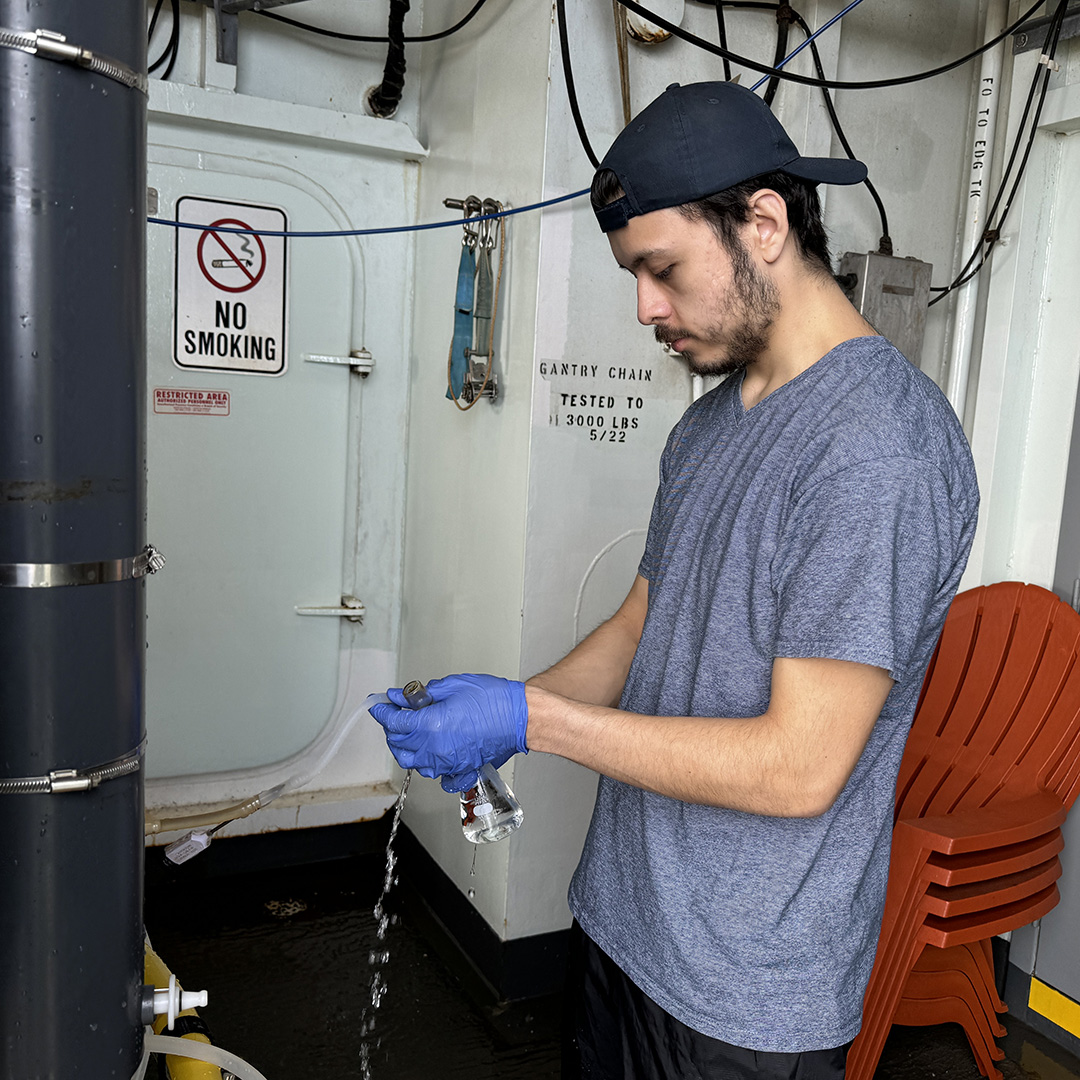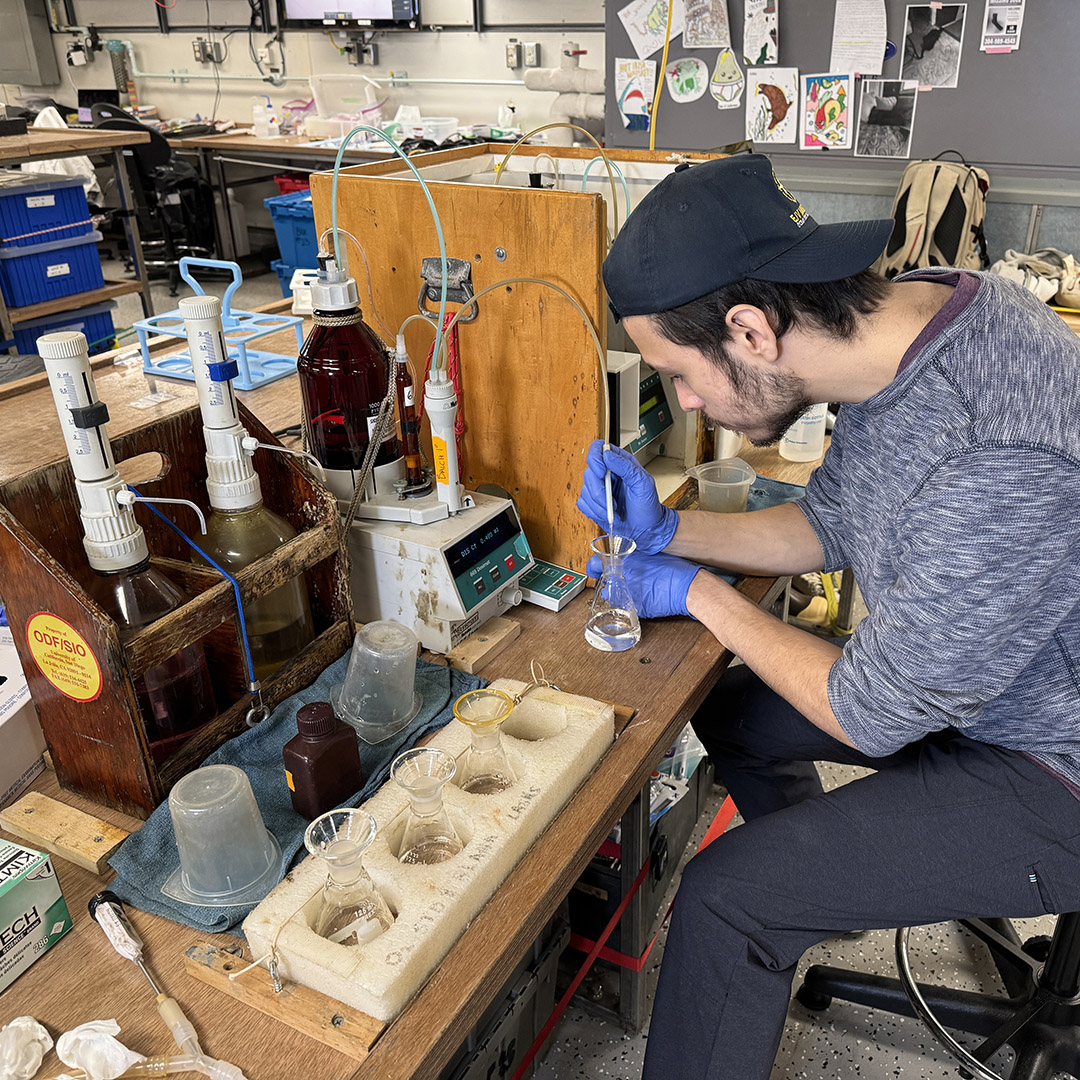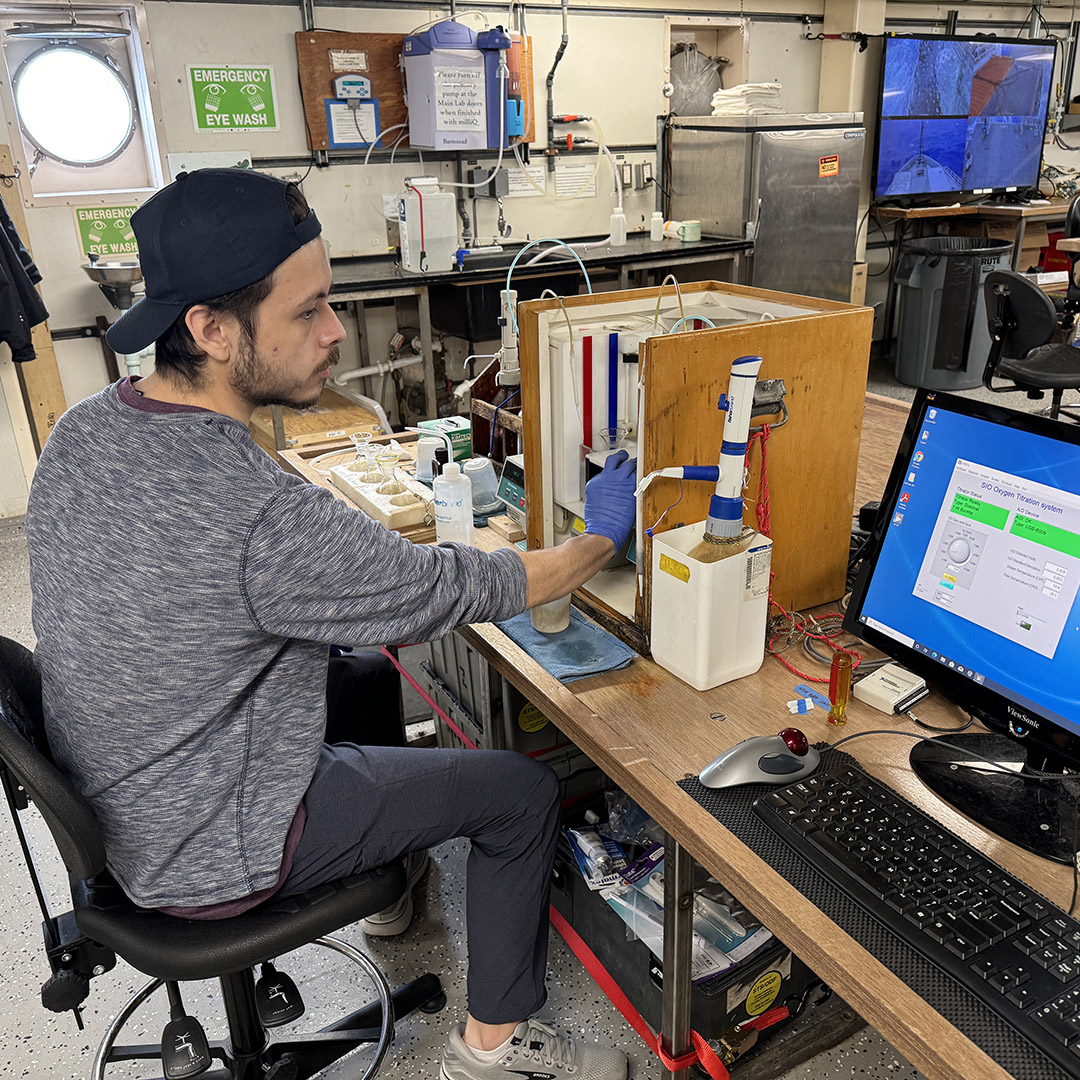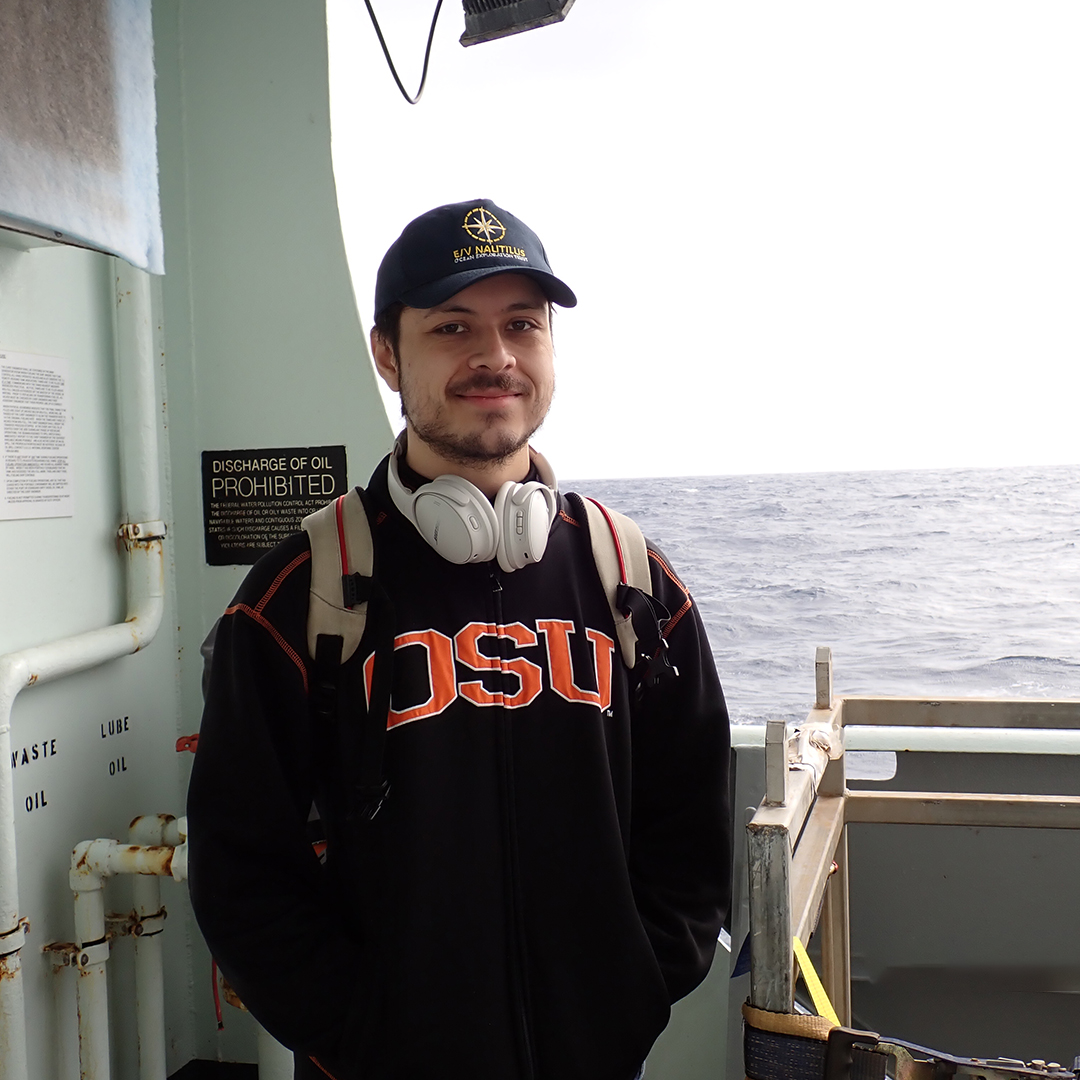Spotlight on Vincent Johnson
Vincent Johnson is an oxygen chemist contracted by Scripps’ Oceanographic Data Facility in San Diego, CA.
If there’s one thing I want to express in this blog post, it’s that you don’t have to know exactly what you want to do for the rest of your life as soon as possible. As you will see from my journey so far and where I might want to head in the future, I am still figuring things out myself.
My name is Vincent Johnson and I am here aboard the R/V Thomas G Thompson as an oxygen chemist contracted by Oceanographic Data Facility (ODF) at Scripps Institution of Oceanography. To tell you the truth I am still surprised that I am even here. For a while I was not sure if there would be scheduling conflicts preventing me from sailing, not to mention I almost missed my connecting flight in Melbourne, but those are stories for another time.

Vincent collecting samples from the CTD rosette.

Processing samples for oxygen analysis.

Processing samples for oxygen analysis,

Processing samples for oxygen analysis.
Over the past five years I’ve had a myriad of different positions, all serving to learn, grow, and better understand what I want to focus on for my career. As a sophomore at Oregon State University majoring in earth sciences, I got a job in January 2020 at the local aquatic research lab to feed fish cadmium-laced food for a biological toxicology study. We all know what happened just a few months later and as a result the entire lab was shut down temporarily. I returned in September and asked the PI for the project if I could help with starting things up again. I was thrust into a role running tests on the fish, performing lab experiments, and dissecting dead specimens all because no one else had come back to help at that point. Even though I already knew that the biological sciences were not my cup of tea, that lab assistant job was undoubtedly a catalyst for shifting my interests into aquatic sciences and chemistry.
Only a year later I found myself taking many oceanography classes, which led to my focus on oceanography for my earth science degree. While in my acoustical oceanography class, which I took completely on a whim and ended up being the only undergraduate in the lectures, I had the opportunity to help with a collaborative study between Oregon State and the Environmental Protection Agency. This project utilized hydrophones to identify boat activity in marine protected areas. My responsibilities as a research assistant involved traveling to the nearby Yaquina Bay, help deploy a hydrophone, and then observe boat traffic around the device for three months to later annotate with the audio recordings. In this work we essentially built a library of boat sounds for the project. I enjoyed contributing to a goal of marine projection for the betterment of marine environments and the oceans.
Only a few months later, after relentless applications and interviews, I landed an internship as a Summer Student Fellow at Woods Hole Oceanographic Institution. Even though it was the summer of 2021 and the internship was almost entirely remote, I still had a blast learning about what it was like to perform independent research on a topic of my choosing. After consulting with my mentor, Caroline Ummenhofer, I chose to research the effects of the Intertropical Convergence Zone (ITCZ) on tropical cyclones in the southwest Indian Ocean. With Caroline’s careful guidance and supportive research group, I was able to take the project from the summer internship all the way to Ocean Sciences Meeting as a student presenter. Even though I felt nervous the entire time while presenting, I still loved the aspect of conducting research.
After graduating I was lucky enough to find a temporary position at Scripps as a data curator with the Climate and Ocean: Variability, Predictability and Change (CLIVAR) program at the CLIVAR and Carbon Hydrographic Data Office (CCHDO). This position helped me develop my coding skills and taught me what standardized hydrographic data should look like. Within the last year I also had the opportunity to sail aboard the E/V Nautilus, with Ocean Exploration Trust (OET). I learned about deep sea floor mapping and OET’s goal to bring ocean science and exploration to the classroom through their telecommunication events with students all over the world. It was a thrilling experience to be aboard a ship yet still able to communicate the fascinating world of ocean science exploration to students on land.

Vincent on the E/V Nautilus in 2023 (Photo by Ocean Exploration Trust).

Vincent on the deck of the R/V Thompson. (Photo by J. McLaughlin).
Everything mentioned has led me to where I am today. My interest in marine sciences spawned with my time at the local aquatic research lab, and my realization that going out to sea was fun only happened recently when I was aboard the E/V Nautilus. Even though each of these experiences differ from one another, they have all been valuable in helping me hone in on exactly where I want to be. In the past I have been so stressed about figuring out exactly what I want to do in my career, but I’ve realized only recently that it’s okay not knowing where you want to be as long as where you are now is helping you learn. Working with Scripps and their STS/ODF groups as an oxygen chemist has been a wonderful experience and has helped me learn about oceanographic sampling, working aboard boats for an extended period, and analyzing dissolved oxygen content in seawater. I was honestly nervous about doing the trip, but I’m glad I did. Had I not, I would not have learned those things, met so many amazing people, or traveled to the Antarctic Circle. Overall, I am glad I was here, glad that it was a valuable learning experience, and I would be glad to do it again!
- Expedition Logs
- 2024 GO-SHIP I08S
- I08S Intro
- Float Checks
- Alphabet Soup
- Trieste
- Weekly Update #1
- Nurse Jennie
- Raphael
- Jess – Salts
- Fishstick!
- Cora – pH
- Swampii
- Southern Ocean
- Seawolves Explore
- Ferruccio
- Abby – pH
- Belmont Bullkelp
- Onboard Sampling
- Vincent – Dissolved Oxygen
- Elisa – Dissolved Oxygen
- Marshal – Alkalinity
- Ruth – CTD
- Vic – DOM
